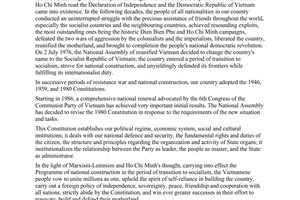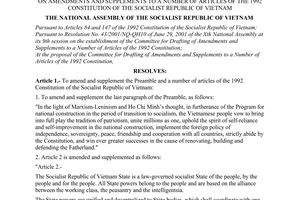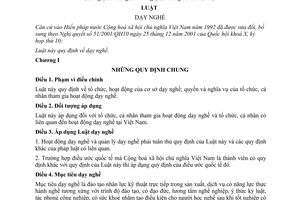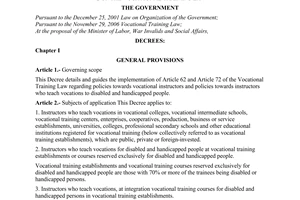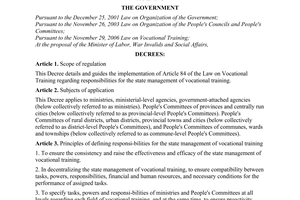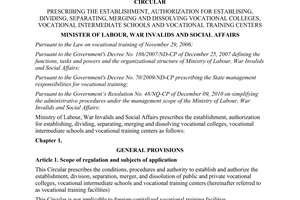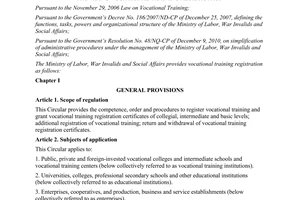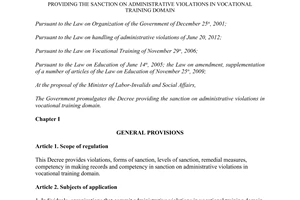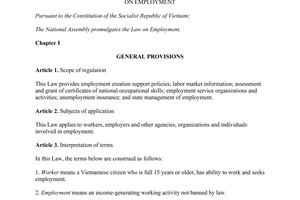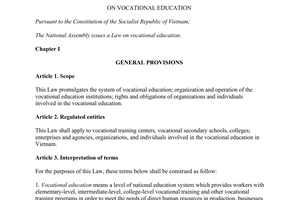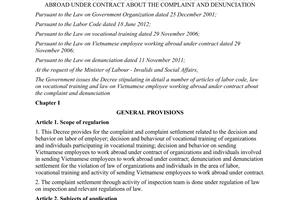Law No. 76/2006/QH11 on vocational training đã được thay thế bởi Law No. 74/2014/QH13 on vocational education và được áp dụng kể từ ngày 01/07/2015.
Nội dung toàn văn Law No. 76/2006/QH11 on vocational training
|
THE
NATIONAL ASSEMBLY |
SOCIALIST
REPUBLIC OF VIET NAM |
|
No: 76/2006/QH11 |
Hanoi, November 29, 2006 |
LAW
ON VOCATIONAL TRAINING
Pursuant to the 1992 Constitution
of the Socialist Republic of Vietnam, which was amended and supplemented under
Resolution No.51/2001/QH10 of December 25, 2001, of the Xth National Assembly,
the 10th session;
This Law provides for vocational training.
Chapter I
GENERAL PROVISIONS
Article 1.- Governing scope
This Law provides for the organization and operation of vocational training institutions; rights and obligations of organizations and individuals participating in vocational training activities.
Article 2.- Subjects of application
This Law applies to organizations and individuals participating in vocational training activities and organizations and individuals involved in vocational training activities in Vietnam.
Article 3.- Application of the Law on Vocational Training
1. Vocational training activities and management of vocational training comply with the provisions of this Law and relevant laws.
2. Where treaties to which the Socialist Republic of Vietnam is a contracting party contain provisions different from those of this Law, the provisions of such treaties prevail.
Article 4.- Objectives of vocational training
Vocational training aims to train technical personnel directly involved in production or services to have professional-practice capabilities commensurate to the training degrees, to possess professional ethics and conscience, sense of discipline, industrial working style and good health with a view to creating conditions for trainees to find jobs after their graduation, to create jobs for themselves or to further their study, meeting the requirements of national industrialization and modernization.
Article 5.- Interpretation of terms
In this Law, the terms below are construed as follows:
1. Vocational training means activities of teaching and learning, which aim to equip trainees with necessary professional knowledge, skills and attitudes so that they can find jobs or self-employ after the completion of their training courses.
2. Modules means study units integrated comprehensively between professional knowledge, practicing skills and professional behaviors with a view to helping trainees acquire the capability to practice completely a job of a profession.
3. Framework programs provide for the content structure, quantity and time volume of modules, study subjects, time ratios between theory and practice, ensuring the objectives of each training discipline.
4. Professional skills standards set the performance extent and the knowledge, skills and attitudes needed for the performance of different jobs of a profession.
Article 6.- Vocational training degrees
There are three degrees in vocational training: the elementary degree, the intermediate degree and the collegial degree. The vocational training covers formal training and continuing training.
Article 7.- State policies on vocational training development
1. To invest in the expansion of a network of vocational training institutions and raise the quality of vocational training, contributing to assuring human resources in service of national industrialization and modernization; contributing to the specialization of lower or upper secondary education graduates; creating conditions for the universalization of vocations for youths and meeting the job-learning demands of laborers; providing vocational training for laborers going to work overseas.
2. To make focal and key investments so as to renew vocational training contents, programs and methods, develop a contingent of trainers, modernize equipment and intensify scientific research with a view to raising the quality of vocational training; to concentrate on building a number of vocational training institutions up to the advanced levels of the region and the world; to attach importance to developing vocational training in areas facing exceptionally difficult socio-economic conditions; to invest in training in vocations demanded by the labor market, which is hardly socialized.
3. To socialize vocational training activities, encouraging Vietnamese and foreign organizations and individuals as well as overseas Vietnamese to set up vocational training institutions and participate in vocational training activities. To encourage artisans and persons with high professional skills to participate in vocational training; to encourage and support training in traditional and rural crafts. Vocational training institutions are equal in vocational training activities and enjoy land, tax and credit incentives according to law.
4. To support policy beneficiaries including people with meritorious services to the country, demobilized armymen, ethnic minority people, members of poor households, disabled or handicapped persons, supportless orphans, direct laborers in agricultural households with farm land recovered and other social- policy beneficiaries with a view to creating opportunities for them to learn vocations in order to find jobs or self-employ, earn their living and make a fortune.
Article 8.- Transferability in training
1. Transferability in training is realized, based on training programs; trainees who further their study from lower to higher degree in the same disciplines or shift to other disciplines or other training degrees are not required to re-study the contents they have learned.
2. Principals of schools specified in Articles 22 and 29 of this Law shall base themselves on vocational training programs to decide on modules, study subjects or contents which trainees shall re-study.
3. The head of the central agency in charge of state management of vocational training shall direct the formulation of vocational training programs to ensure transferability between different degrees in vocational training.
4. The Education and Training Minister shall assume the prime responsibility for, and coordinate with the head of the central agency in charge of state management of vocational training in, providing for transferability between the intermediate and collegial levels and the university level of the same disciplines.
Article 9.- Prohibited acts in vocational training
1. Taking advantage of vocational training activities to seek personal profits, abuse labor force.
2. Hurting the honor or dignity, infringing upon the bodies of trainers, administrators or staff members of vocational training institutions or of trainees.
3. Committing fraudulence in enrolment of trainees, examinations, tests, grant of professional diplomas and certificates.
Chapter II
VOCATIONAL-TRAINING DEGREES
Section 1. ELEMENTARY VOCATIONAL TRAINING DEGREE
Article 10.- Elementary degree vocational training objectives
Elementary-degree vocational training aims to equip trainees with the capability to practice a simple profession or the capability to practice a number of jobs of a profession; with professional ethics and conscience, sense of discipline, industrial working style, good health, creating conditions for graduating trainees to find jobs, self-employ or further their study to higher levels.
Article 11.- Elementary-degree vocational training duration
Elementary-degree vocational training is conducted for between three months and less than one year for persons with educational level and health suitable to the occupations they need to learn.
Article 12.- Requirements on elementary-degree vocational training contents and methods
1. Elementary-degree vocational training contents must be compatible with the elementary-degree vocational training objectives, focus on practicing capabilities and be suitable to reality and scientific and technological development.
2. Elementary-degree vocational training methods must attach importance to training in practicing skills and promote dynamism and voluntariness of trainees.
Article 13.- Elementary-degree vocational training programs
1. Elementary-degree vocational training programs reflect the elementary-degree vocational training objectives; specify the knowledge and skill standards, the scope and structure of vocational training contents, methods and forms; ways of assessing the study results for each module or each discipline.
2. Elementary-degree vocational training programs shall be elaborated and approved by heads of vocational training institutions defined in Article 15 of this Law.
Article 14.- Elementary-degree vocational training syllabuses
Elementary-degree vocational training syllabuses detail the requirements on knowledge, skills of each module in the vocational training program, creating conditions for the application of active teaching methods. Heads of vocational training institutions defined in Article 15 of this Law shall organize the compilation of and approve the syllabuses, which serve as official teaching and learning documents.
Article 15.- Elementary-degree vocational training institutions
1. Vocational training centers.
2. Intermediate vocational-training schools and colleges which register for elementary-degree vocational training.
3. Enterprises, cooperatives, other production, business or service establishments (below collectively referred to as enterprises), professional secondary schools, colleges, universities and other educational institutions which register for elementary-degree vocational training.
Article 16.- Elementary-degree professional certificates
Trainees who finish an elementary-degree vocational training program and fully meet the conditions may sit for examinations; if passing such examinations, they are granted elementary-degree professional certificates by heads of vocational training institutions defined in Article 15 of this Law under the regulations of the head of the central agency in charge of state management of vocational training.
Section 2. INTERMEDIATE VOCATIONAL TRAINING DEGREE
Article 17.- Intermediate-degree vocational training objectives
Intermediate-degree vocational training aims to equip trainees with professional knowledge and capabilities to practice jobs of a profession, who can work independently and apply techniques and technologies to their work; have professional ethics and conscience, sense of discipline, industrial working styles and good health, and to create conditions for graduates to find jobs, self-employ or further their study to higher levels.
Article 18.- Intermediate-degree vocational training duration
Intermediate-degree vocational training is conducted for between one and two years, depending on the disciplines, for persons who possess an upper secondary education diploma; between three and four years, depending on the disciplines, for persons who possess a lower secondary education diploma.
Article 19.- Requirements on intermediate-degree vocational training contents and methods
1. Intermediate-degree vocational training contents must comply with the intermediate-degree vocational training objectives, focusing on the capabilities to practice jobs of a profession, raising the educational levels required by the training, ensuring their systematicity, fundamentals and suitability to reality and scientific and technological development.
2. Intermediate-degree vocational training methods must combine training in practicing capability with supply of professional knowledge and promote trainees' dynamism, voluntariness and capability to work independently.
Article 20.- Intermediate-degree vocational training programs
1. Intermediate-degree vocational training programs must reflect the intermediate-degree vocational training objectives; define the standards on knowledge, skills, scope and structure of vocational training contents, methods and forms as well as ways of assessing the study results for each module, study subject or discipline.
2. The head of the central agency in charge of state management of vocational training shall coordinate with relevant ministers, heads of ministerial-level agencies and heads of government-attached agencies in organizing the formulation of framework programs on vocational training.
3. The head of the central agency in charge of state management of vocational training shall decide to set up a council for appraisal of vocational training framework programs; define the tasks, powers, operation mode and membership of the council; promulgate vocational training framework programs on the basis of the results of appraisal by the council for appraisal of intermediate-degree vocational training framework programs.
4. Based on the framework programs, principals of schools defined in Article 22 of this Law shall organize the elaboration of and approve vocational training programs for their respective schools.
Article 21.- Intermediate-degree vocational training syllabuses
Intermediate-degree vocational training syllabuses must detail the requirements on knowledge, skills of each module, each study subject in the vocational training program, creating conditions for the application of active teaching methods. Principals of schools defined in Article 22 of this Law shall organize the elaboration of and approve teaching syllabuses for use as official teaching and learning documents.
Article 22.- Intermediate-degree vocational training institutions
1. Professional secondary schools.
2. Vocational training colleges registering for intermediate-degree vocational training,
3. Professional secondary schools, colleges and universities registering for intermediate-degree vocational training.
Article 23.- Intermediate-degree vocational training diplomas
Trainees who finish a intermediate-degree vocational training program and fully meet the prescribed conditions may sit for examinations; if passing such examinations, they are granted intermediate-degree vocational training diplomas by principals of schools defined in Article 22 of this Law according to regulations of the head of the central agency in charge of state management of vocational training.
Section 3. VOCATIONAL- TRAINING COLLEGES
Article 24.- Collegial-degree vocational training objectives
Collegial-degree vocational training aims to equip trainees with professional knowledge and capabilities to practice jobs of a profession, who are capable of working independently and in groups, have the capability to create and apply techniques and technologies to their work and settle complicated circumstances in reality; have professional ethics and conscience, sense of discipline, industrial working styles and good health, and aims to create conditions for graduates to find jobs, self-employ or further their study at higher levels.
Article 25.- Collegial-degree vocational training duration
Collegial-degree vocational training is conducted for between two and three years, depending on the training disciplines, for persons possessing an upper secondary school diploma; between one and two years, depending on the disciplines, for persons possessing an intermediate professional degree in the same disciplines.
Article 26.- Requirements on collegial-degree vocational training contents and methods
1. Collegial-degree vocational training contents must be compatible with the collegial-degree vocational training objectives, focusing on capabilities to practice various jobs of a profession, to raise the professional knowledge according to the vocational training requirements, ensuring their systematicity, fundamentals, modernity, practicality and satisfy the scientific and technological development.
2. Collegial-degree vocational training methods must combine training in practicing capabilities with supply of professional knowledge, and promote activity, voluntariness, dynamism, and capability to organize group work.
Article 27.- Collegial-degree vocational training programs
1. Collegial-degree vocational training programs reflect the collegial-degree vocational training objectives; provide the standards on knowledge, skills, scope and structure of vocational training contents, methods and forms; ways of assessing the study results for each module, study subject and or discipline.
2. The head of the central agency in charge of state management of vocational training shall coordinate with relevant ministers, heads of ministerial-level agencies and heads of government-attached agencies in organizing the formulation of collegial-degree vocational training programs.
3. The head of the central agency in charge of state management of vocational training shall decide to set up a council for appraisal of the collegial-degree vocational training framework program; define the tasks, powers, operation modes and membership of the council; promulgate the collegial-degree vocational training framework program on the basis of the results of appraisal by the council for appraisal of the collegial-degree vocational training framework program.
4. Based on the framework programs, principals of schools defined in Article 29 of this Law shall organize the elaboration of, and approve the vocational training programs for their respective schools.
Article 28.- Collegial-degree vocational training syllabuses
Collegial-degree vocational training syllabuses must detail the requirements on knowledge contents, skills of each module, study subject in the vocational training program, creating conditions for application of active teaching methods. Principals of schools defined in Article 29 of this Law shall organize the compilation of and approve the teaching syllabuses for use as official teaching and learning documents.
Article 29.- Collegial-degree vocational training institutions
1. Vocational training colleges.
2. Colleges and universities registering for collegial-degree vocational training.
Article 30.- Collegial-degree vocational training diplomas
Trainees who finish a collegial-degree vocational training program and satisfy the prescribed conditions may sit for examinations; if passing such examinations, they are granted collegial-degree vocational training diplomas by principals of schools defined in Article 29 of this Law under the regulations of the head of the central agency in charge of state management of vocational training.
Section 4. FORMAL VOCATIONAL TRAINING AND CONTINUING VOCATIONAL TRAINING
Article 31.- Formal vocational training
Formal vocational training applies to elementary, intermediate and collegial vocational training programs at vocational training institutions specified in Articles 15, 22 and 29 of this Law in formal and continuing training courses.
Article 32.- Continuing vocational training
1. Continuing vocational training applies to vocational training programs defined in Clause 1, Article 33 of this Law.
2. Continuing vocational training is conducted in a flexible manner in terms of time, venue and training methods to suit trainees' needs with a view to creating conditions for laborers to study all their lives and raise their professional skills compatible with the labor market's requirements, giving them opportunities to find jobs or self-employ.
Article 33.- Continuing vocational training programs and methods
1. Continuing vocational training programs include:
a/ Programs on fostering, raising, updating professional knowledge and skills;
b/ Programs on vocational training in forms of apprentice, hand-down of professions;
c/ Programs on technology transfer;
d/ Vocational training programs specified in Articles 13, 20 and 27 of this Law are conducted in the form of in-service training or guided self-training in order to be granted elementary vocational training certificates, intermediate vocational training diplomas or collegial-level vocational training diplomas.
2. Continuing vocational training methods must promote trainees' active roles, self-training capacity and experience.
3. Heads of vocational training institutions defined in Article 15 of this Law shall formulate continuing vocational training programs specified at Points a, b and c, Clause 1 of this Article, organize the implementation thereof and grant vocational training certificates to trainees. A certificate must clearly state the contents and duration of the training course.
Lecturers on continuing vocational training programs defined at Point a, b and c, Clause 1 of this Article are teachers, scientists, artisans and professionally skilled persons.
4. Vocational training institutions defined in Article 15, 22 and 29 of this Law may organize the implementation of vocational training programs defined at Point d, Clause 1 of this Article only after ensuring the performance of the task of formal vocational training.
Chapter III
ENROLMENT OF TRAINEES, VOCATIONAL TRAINING CONTRACTS, EXAMS AND TESTS
Article 34.- Enrolment of trainees
1. Enrolment of elementary vocational trainees is carried out in the form of consideration and enrolment.
2. Enrolment of intermediate vocational trainees is carried out in the form of consideration and enrolment.
3. Enrolment of collegial vocational trainees is carried out in the form of consideration and enrolment or exams and enrolment.
4. Cases entitled to direct enrolment into vocational training colleges cover:
a/ Persons holding intermediate vocational training diplomas of satisfactory or higher levels and registering to study the same disciplines;
b/ Persons holding intermediate vocational training diplomas and registering to study the same disciplines if they have worked on their trained vocations for at least two years.
5. Enrolment of vocational trainees is carried out once or many times in a year, depending on the training capability of vocational training institutions, the duration of training courses and the demands of trainees or enterprises.
6. The Regulation on enrolment of vocational trainees is promulgated by the head of the central agency in charge of state management of vocational training.
Article 35.- Vocational training contracts
1. Vocational training contract mean the agreement on the rights and obligations between the head of a vocational training institution and a trainee.
2. Vocational training contracts must be concluded in writing in the following cases:
a/ Enterprises recruit people for vocational training to work for them;
b/ Vocational training is conducted at foreign-invested vocational training institutions.
3. Vocational training contracts are concluded verbally or in writing in the following cases of:
a/ Hand-down of professions;
b/ Professional apprentice at enterprises.
4. Vocational training contracts are concluded directly between heads of vocational training institutions and trainees. If a contract is concluded in writing, it must be made in two copies of equal validity, each kept by a contracting party.
Article 36.- Contents of vocational training contracts
1. A vocational training contract contains the following details:
a/ The name of the training discipline, professional skills expected to reach.
b/ The venues of training and practice;
c/ The completion time of the training course;
d/ The training charge and mode of payment;
e/ Each contracting party's liabilities to pay damages upon contractual breach;
f/ Other agreements not contrary to law and social ethics.
2. If enterprises recruit people for training to work for them, apart from the contents specified in Clause 1 of this Article, a vocational training contract must also cover the following contents:
a/ Trainee's commitment on the duration of working for the enterprise;
b/ The enterprise's commitment to conclude a labor contract after completing the training course;
c/ Remuneration paid to trainee who directly turns out or participates in turning out products for the enterprise during his/her vocational training.
3. Contracts on vocational training in the form of professional apprentice at enterprises must, apart from the contents defined in Clause 1 of this Article, contain agreements on the time of commencing payment of remuneration and the levels of remuneration according to each period of time.
Article 37.- Termination of vocational training contracts
1. Trainees who unilaterally terminate their vocational training contracts shall not be refunded their school fees. If trainees leave for the reasons of performance of their military service obligations or ailment, accidents or maternity which render them poor health or difficulties confronting their families which make them unable to continue their vocational training, they shall be refunded a school fee amount corresponding to the remaining study duration.
2. Vocational training institutions that unilaterally terminate vocational training contracts shall notify trainees thereof at least three working days in advance and fully refund the collected school fee amounts, except for force majeure cases provided by civil law.
3. If trainees are recruited for vocational training to work for enterprises but decline to work as committed, they shall repay vocational training expenses. The repayment levels shall be agreed upon by the two parties under vocational training contracts.
Vocational training expenses cover reasonable expenses for lecturers, documents, expenses for practice materials, workshop and machinery amortization and other expenses already paid for trainees.
Article 38.- Exams, tests
1. Exams and tests in the vocational training process cover periodical tests; tests at the end of modules or study subjects under the promulgated programs; graduation exams or course-end tests.
2. The head of the central agency in charge of state management of vocational training shall promulgate regulations on exams and tests.
Chapter IV
VOCATIONAL TRAINING INSTITUTIONS
Section 1. ORGANIZATION AND OPERATION OF VOCATIONAL TRAINING CENTERS, PROFESSIONAL SECONDARY SCHOOLS, VOCATIONAL- TRAINING COLLEGES
Article 39.- Types of vocational training centers, professional secondary schools, vocational training colleges
1. Public vocational-training centers, professional secondary schools and vocational training colleges which are established, materially invested and supplied with funds for regular tasks by the State.
2. Private vocational-training centers, professional secondary schools and vocational training colleges which are established, materially invested and supplied with funds for regular tasks by organizations or individuals.
3. Vocational training centers, professional secondary schools and vocational training colleges which are foreign-invested and established in the form of joint venture or with 100% foreign capital with foreign organizations or individuals, overseas Vietnamese investing in the construction of material foundations and supplying funds for regular tasks.
Article 40.- Conditions for establishment of vocational training centers, professional secondary schools, vocational training colleges
1. Vocational training centers, professional secondary schools and vocational training colleges may be established when the blueprints thereon satisfy the following principal conditions:
a/ Having school establishments, classrooms, financial capability and equipment for theoretical teaching and practice suitable to training disciplines, levels and scale;
b/ Having a contingent of lecturers and administrators enough in quantity, synchronous in structure, meeting the criteria on quality, standard levels and professional skills to attain the vocational training objectives and realize the vocational training programs.
2. Specific conditions for establishment of vocational training centers, professional secondary schools and vocational training colleges shall be set by the head of the central agency in charge of state management of vocational training.
Article 41.- Competence and procedures to establish, to permit the establishment of, to suspend vocational training activities of, to permit the merger, division, separation or dissolution of, vocational training centers, professional secondary schools or vocational training colleges
1. The competence to establish public vocational training centers, professional secondary schools or vocational training colleges and permit the establishment of private vocational training centers, professional secondary schools or vocational training colleges is provided as follows:
a/ Presidents of provincial/municipal People's Committees (below collectively referred to as presidents of provincial-level People's Committees) decide to establish public vocational training centers, professional secondary schools and vocational training colleges of their respective provinces and permit the establishment of private vocational training centers, professional secondary schools and vocational training colleges in their localities;
b/ Ministers, heads of ministerial-level agencies and heads of central bodies of socio-political organizations decide to establish their attached vocational training centers and professional secondary schools;
c/ The head of the central agency in charge of state management of vocational training decides to establish public vocational training colleges and permits the establishment of private vocational training colleges.
2. Persons competent to decide on or permit the establishment of vocational training centers, professional secondary schools and vocational training colleges are competent to suspend vocational training activities of, to merge, divide, separate or dissolve such centers, schools and colleges.
3. The procedures to establish, permit the establishment of, to suspend vocational training activities of, to merge, divide, separate or dissolve vocational training centers, professional secondary schools and vocational training colleges, and the registration of their vocational training activities shall be specified by the head of the central agency in charge of state management of vocational training.
Article 42.- Suspension of vocational training activities
1. Vocational training activities of vocational training institutions defined in Articles 15, 22 and 29 of this Law are suspended when the violations of law on vocational training cause serious consequences.
2. Vocational training activities for every discipline of vocational training institutions defined in Articles 15, 22 and 29 of this Law are suspended when one of the following acts of violating the law on vocational training is committed:
a/ Failing to satisfy the conditions on school establishments and classrooms, finance, material foundations, vocational training equipment, which are specified at Point a, Clause 1, Article 40 of this Law;
b/ Failing to satisfy the conditions on the contingent of administrators and vocational trainers, which are specified at Point b, Clause 1, Article 40 of this Law.
3. The vocational training suspension duration complies with the following regulations:
a/ The suspension of vocational training activities of vocational training institutions lasts until the violations are addressed, but must not exceed 24 months. If past this time limit the violations are not yet addressed, the vocational training institutions defined in Clause 3 of Article 15, Clause 3 of Article 22 and Clause 2 of Article 29 of this Law may not continue their vocational training activities; the vocational training institutions defined in Clauses 1 and 2 of Article 15, Clauses 1 and 2 of Article 22 and Clause 1 of Article 29 of this Law shall be dissolved under the provisions of Article 43 of this Law;
b/ The suspension of vocational training activities for any discipline of vocational training institutions lasts until the violations are addressed, but must not exceed 12 months. If past this time limit the violations are not yet addressed, the vocational training institutions may not continue their vocational training activities for the discipline where the violations are not yet addressed.
Article 43.- Dissolution of vocational training centers, professional secondary schools or vocational training colleges
1. Vocational training centers, professional secondary schools or vocational training colleges are dissolved in the following cases:
a/ Their acts of violating the law on vocational training cause particularly serious consequences;
b/ Upon the expiration of the vocational training suspension, the vocational training centers, professional secondary schools or vocational training colleges still fail to address their violations;
c/ At the request of organizations or individuals that have established them;
d/ When the operation duration stated in the regulations or charters of vocational training centers, professional secondary schools or vocational training colleges expire.
2. The dissolved vocational training centers, professional secondary schools or vocational training colleges must draw up plans to settle the interests of their officials, lecturers, employees, laborers and trainees and fulfill the financial obligations according to law and submit them to persons competent to decide on or permit the establishment of vocational training centers, professional secondary schools or vocational training colleges for consideration and decision.
Article 44.- Regulations of vocational training centers, charters of professional secondary schools, charters of vocational training colleges
1. The model regulation of vocational training centers contains the following principal details:
a/ Tasks and powers of the vocational training center;
b/ Tasks and rights of trainers and trainees;
c/ The organization, operation and management of the vocational training center;
d/ The relationship between the vocational training center and enterprises as well as the society.
2. The model charter of professional secondary schools and the model charter of vocational training colleges contain the principal details specified in Clause 2, Article 52 of the Education Law.
3. The model regulation of vocational training centers, the model charter of professional secondary schools and the model charter of vocational training colleges shall be promulgated by the head of the central agency in charge of state management of vocational training.
4. Vocational training centers shall base on the model regulation to formulate their respective regulations. Professional secondary schools and vocational training colleges shall base on the model charters to formulate their respective charters.
Article 45.- Directors of vocational training centers
1. The director of a vocational training center must fully meet the following criteria:
a/ Possessing good quality and morals;
b/ Possessing a college diploma or higher degree;
c/ Being trained and fostered in management operation;
d/ Being physically fit according to regulations.
2. Competence to appoint or recognize a director of a vocational training center is provided for as follows:
a/ The person competent to decide on the establishment of a public vocational training center shall appoint the director of the attached public vocational training center;
b/ Presidents of provincial-level People's Committees shall recognize directors of private vocational training centers in their respective localities at the proposal of organizations or persons contributing capital to the establishment of such centers or individuals owning such centers.
3. Directors of vocational training centers have the following tasks and powers:
a/ To manage and administer activities of their vocational training centers;
b/ To grant elementary vocational training certificates.
4. Procedures for appointing or recognizing directors of vocational training centers comply with the regulations of the head of the central agency in charge of state management of vocational training.
Article 46.- Principals of professional secondary schools or vocational training colleges
1. The principal of a professional secondary school or vocational training college must fully meet the following criteria:
a/ Possessing good quality and morals; having practiced the vocational training or participated in vocational training administration for at least 5 years;
b/ Possessing a university diploma or higher degree, for principals of professional secondary schools; a master or higher degree, for principals of vocational training colleges;
c/ Having been trained or fostered in management operation;
d/ Being physically fit according to regulations.
2. Competence to appoint and recognize principals of professional secondary schools and principals of vocational training colleges is provided for as follows:
a/ Ministers, heads of ministerial-level agencies, heads of government-attached agencies, presidents of provincial/municipal People's Committees, heads of central bodies of socio-political organizations appoint principals of their attached public professional secondary schools and principals of their attached public vocational training colleges.
b/ Provincial-level People's Committee presidents recognize principals of private professional secondary schools in their respective localities at the proposal of the managing boards or individuals being owners of those schools;
c/ The head of the central agency in charge of state management of vocational training recognizes principals of private vocational training colleges at the proposal of the managing boards or individuals being owners of the schools.
3. Principals of professional secondary schools and principals of vocational training colleges have the following tasks and powers:
a/ To manage and administer activities of their schools;
b/ Principals of professional secondary schools grant intermediate vocational training diplomas and elementary vocational training certificates; principals of vocational training colleges grant college diplomas, intermediate vocational training diplomas and elementary vocational training certificates.
4. Procedures for appointment and recognition of principals of professional secondary schools and principals of vocational training colleges comply with the regulations of the head of the central agency in charge of state management of vocational training.
Article 47.- School councils
1. A school council shall be set up for public professional secondary schools and vocational training colleges; a management council shall be set up for private professional secondary schools and vocational training colleges with two or more capital-contributing members (below collectively referred to as school councils).
2. A school council has the following tasks and powers:
a/ To decide on school development orientations, objectives, plans and projects;
b/ To decide on the school's charter or on the amendment and supplementation thereof for submission to competent authorities for approval;
c/ To decide to mobilize and supervise the use of school resources.
d/ To supervise the materialization of its resolutions, regulations on democracy in activities of the school.
3. Procedures for establishment, the organizational structure, specific tasks and powers of school councils are provided in the model charter of professional secondary schools and model charter of vocational training colleges.
Article 48.- Party organizations, mass organizations, social organizations in vocational training centers, professional secondary schools, vocational training colleges
Communist Party of Vietnam organizations, mass organizations and social organizations in vocational training centers, professional secondary schools and vocational training colleges operate under their respective charters and the provisions of law.
Article 49.- Advisory councils, vocational training program- and syllabus- appraising councils in vocational training centers, professional secondary schools, vocational training colleges
1. Advisory councils in vocational training centers, professional secondary schools or vocational training colleges are set up by their directors or principals to gather comments of trainers, administrators and representatives of various organizations in those centers or schools in order to perform a number of tasks and powers of the directors or principals.
2. A vocational training program- and syllabus- appraising council is an advisory council assisting the director or principal in approving the program and syllabuses. An appraising council comprises vocational trainers, administrators, scientists, technicians and employers knowledgeable about vocations. It is composed of between five and nine members, depending on the to-be-appraised programs or syllabuses.
3. The organization, operation, tasks and powers of advisory councils and vocational training program- and syllabus- appraising councils are provided by the directors or principals.
Article 50.- Tasks and powers of vocational training centers, professional secondary schools, vocational training colleges
1. Vocational training centers, professional secondary schools and vocational training colleges have the tasks, powers, autonomy and accountability prescribed in Articles 58, 59 and 60 of the Education Law.
2. Apart from the tasks and powers defined in Clause 1 of this Article, vocational training centers, professional secondary schools and vocational training colleges also have the following tasks and powers:
a/ To provide free-of-charge consultancy on vocational training and employment for trainees;
b/ To organize study tours and practice at enterprises for trainees;
c/ To enter into vocational training joint ventures or associations with enterprises, domestic organizations and individuals, foreign organizations and individuals;
d/ To set up enterprises and organize production, business or service activities under provisions of law;
e/ To integrate the teaching of languages, customs and relevant law of the countries where laborers go to work and relevant Vietnamese law into vocational training programs when organizing vocational training for laborers who go to work overseas.
Section 2. FOREIGN-INVESTED VOCATIONAL TRAINING CENTERS, PROFESSIONAL SECONDARY SCHOOLS, VOCATIONAL TRAINING COLLEGES
Article 51.- Foreign-invested vocational training centers, professional secondary schools, vocational training colleges
1. Foreign-invested vocational training centers, professional secondary schools and vocational training colleges have their legitimate rights and interests protected by the Vietnamese State under Vietnamese law and treaties to which the Socialist Republic of Vietnam is a contracting party.
2. Foreign-invested vocational training centers, professional secondary schools and vocational training colleges shall conduct vocational training activities under the provisions of this Law and relevant laws.
Article 52.- Establishment of foreign-invested vocational training centers, professional secondary schools or vocational training colleges
1. Foreign-invested vocational training centers, professional secondary schools and vocational training colleges may be set up when the following conditions are fully met:
a/ Having an adequate contingent of administrators and trainers;
b/ Having school establishments, equipment for theoretical teaching and practice suitable to the training vocations, levels and scale;
c/ Having bank's written certification of the charter capital.
2. Competent state management agencies in charge of investment shall grant investment certificates to foreign-invested vocational training centers, professional secondary schools or vocational training colleges when the conditions specified in Clause 1 of this Article are fully met and the written agreement of competent state management agencies in charge of vocational training is available.
Section 3. POLICIES TOWARD VOCATIONAL TRAINING INSTITUTIONS
Article 53.- Policies toward vocational training institutions
1. The State adopts policies on assignment or lease of land or material foundations, on credit incentives, tax exemption or reduction for vocational training institutions under the provisions of law; exempts taxes under the provisions of law for products created from vocational training activities in service of vocational training establishments.
2. People's Committees at all levels shall create favorable conditions for vocational training institutions, other training institutions and scientists to disseminate scientific and technical advances and to transfer technologies, especially in the domains of agriculture, forestry and fishery.
3. Private vocational training institutions enjoy policies specified in Articles 65, 66, 67 and 68 of the Education Law.
Article 54.- Policies toward vocational training institutions which admit boarding pupils of ethnic minority and vocational training institutions which train Vietnamese laborers who go to work overseas
1. The State adopts investment policies to ensure conditions for vocational training institutions to receive boarding pupils of ethnic minority for vocational training after their graduation from general education schools.
2. The State adopts policies to support vocational training institutions in developing vocations to meet the vocational training demand of laborers who go to work overseas.
Chapter V
RIGHTS AND OBLIGATIONS OF ENTERPRISES IN VOCATIONAL TRAINING ACTIVITIES
Article 55.- Rights of enterprises in vocational training activities
1. To set up vocational training centers, professional secondary schools and vocational training colleges for training human resources directly engaged in their production and business activities and human resources for the society.
2. To organize vocational training for laborers they will employ; to be supported by the State when they admit disabled people for vocational training and employ them.
3. To enter into joint venture or association with vocational training institutions in organizing vocational training for laborers; organizing research, production, application and transfer of technologies under the provisions of this Law and other relevant laws.
4. To be invited by state management agencies in charge of vocational training or by vocational training institutions to participate in vocational training program- and syllabus-appraising councils; to instruct and guide professional apprentice and evaluate the study results of trainees; to participate in formulating national standards on professional skills and assessment of professional skills with regard to vocations related to production and business activities of enterprises.
5. To exclude the following expenses for the purpose of calculation of taxable incomes according to law:
a/ Investment amounts and reasonable expenses of enterprises for maintenance of operation of vocational training institutions in direct service of their production and business activities;
b/ Vocational training expenses for laborers recruited to work for enterprises.
Article 56.- Obligations of enterprises in vocational training activities
1. To supply information on their training disciplines, training and employment demands to vocational training state management agencies.
2. To receive trainees who come to enterprises for visits, professional skill practice under contracts signed with vocational training institutions.
3. To pay remuneration to trainees who directly turn out or participate in turning out products for enterprises. Remuneration levels shall be agreed upon by two parties.
Article 57.- Obligations of enterprises providing skills training and fostering and retraining for their laborers
1. To formulate and implement training and fostering plans to raise their laborers' professional skills in order to meet their human resource demands and renew production and business technologies.
2. To create conditions for their laborers to take on-the-job training courses in order to raise their professional skills.
3. To provide vocational re-training for their laborers when they are transferred to perform other jobs in the enterprises. Training expenses, wages and remuneration for laborers during their vocational training shall be paid by enterprises.
Chapter VI
VOCATIONAL TRAINERS AND TRAINEES
Section 1. VOCATIONAL TRAINERS
Article 58.- Vocational trainers
1. Vocational trainers are those who teach theories and practice or both in vocational training institutions.
2. Vocational trainers must meet the criteria specified in Clause 2, Article 70 of the Education Law.
3. The standard qualifications of vocational trainers are provided for as follows:
a/ Elementary vocational training theory teachers must possess intermediate vocational training diplomas or higher degrees; practice trainers must possess intermediate vocational training diplomas or higher degrees or be artisans or persons with high professional skills;
b/ Intermediate vocational training theory teachers must possess diplomas of technical teachers' training universities or specialized universities or higher levels; practice trainers must possess professional college diplomas or be artisans or persons with high professional skills;
c/ College theory teachers must possess diplomas of technical teachers' training universities or specialized universities or higher degrees; practice trainers must possess diplomas of vocational training colleges or be artisans or persons with high professional skills;
d/ Where vocational trainers defined at Points a, b or c of this Clause do not possess diplomas of technical teachers' training colleges or universities, they must possess teachers' training certificates.
Article 59.- Tasks and rights of vocational trainers
1. Vocational trainers have the tasks defined in Article 72 of the Education Law.
2. Vocational trainers have the rights defined in Article 73 of the Education Law and the following rights:
a/ To go on field trips to production establishments, approaching new technologies;
b/ To use documents, means, teaching aids and equipment and material foundations of vocational training institutions for the performance of their assigned tasks;
c/ To contribute opinions on undertakings and plans of vocational training institutions, on the formulation of programs, syllabuses and teaching methodology and matters related to their interests.
Article 60.- Recruitment and professional fostering of vocational trainers
1. Recruited vocational trainers at public vocational training institutions must satisfy the criteria specified in Clauses 2 and 3, Article 58 of this Law and comply with the provisions of law on public servants and labor law.
2. Recruited vocational trainers at private vocational training institutions must satisfy the criteria specified in Clauses 2 and 3, Article 58 of this Law and comply with the provisions of labor law.
3. The fostering for standardization, the fostering to raise professional and pedagogical qualifications, professional skills, informatics and foreign languages for vocational trainers comply with regulations of the head of the central agency in charge of state management of vocational training.
Article 61.- Guest-lecturing
1. Vocational training institutions may invite persons who meet the criteria specified in Clauses 2 and 3, Article 58 of this Law to give lectures under the guest-lecturing regime.
2. Guest lecturers shall perform the tasks defined in Article 72 of the Education Law.
3. Guest lecturers who are public servants shall fulfill the tasks at their work places.
Article 62.- Policies toward vocational trainers
1. To enjoy policies on professional training and fostering, policies on wage and policies towards teachers working in special schools, areas meeting with exceptional socio-economic difficulties specified in Articles 80, 81 and 82 of the Education Law.
2. To enjoy allowances when instructing practice in heavy, hazardous or dangerous jobs under the Government's regulations and enjoy other policies toward teachers.
Section 2. TRAINEES
Article 63.- Tasks and rights of trainees
Trainees have the tasks and rights defined in Articles 85 and 86 of the Education Law.
Article 64.- Trainees' obligation to work for a definite term
1. Graduates from vocational training courses who are enrolled by nomination or under State-ordered programs and granted scholarships, vocational training expenses or foreign funds under agreements signed with the Vietnamese State must abide by the State's mobilization for work for a definite term; if not, they must refund scholarships and vocational training expenses.
2. Graduates from vocational training courses who are granted scholarships and vocational training expenses by employers must work for the latter for a duration committed in their vocational training contracts; if failing to fulfill their commitment, they must refund scholarships and vocational training expenses.
Article 65.- Policies toward trainees
1. Trainees are entitled to scholarship and social relief policies, nomination-based enrolment regime, education credit policies, public service charge reduction or exemption policies applicable to pupils and students under the provisions of Articles 89, 90, 91 and 92 of the Education Law.
2. Graduates from boarding ethnic minority lower secondary schools or upper secondary schools, including boarding schools financed by people, are entitled to be enrolled directly into intermediate vocational training schools.
3. When switching to vocational training, pupils of boarding ethnic minority general education schools are entitled to policies applicable to pupils of boarding ethnic minority general education schools.
4. In the course of vocational training, if trainees cannot continue their study due to the performance of military service, ailments, accidents, maternity or difficulties met by their families, they are entitled to reserve their study results and may resume their vocational training to accomplish the training courses. The time for reserve of vocational training results does not exceed four years.
Article 66.- Policies toward trainees to-be-guest workers
1. The State adopts policies to organize vocational training for to-be-guest workers.
2. If trainees leave to work overseas midway, they are entitled to the reserve of their vocational training results. The time for reserve of vocational training results does not exceed four years.
Article 67.- Policies toward prize winners at trainees' contests
1. The State encourages trainees to participate in trainees' contests in order to raise their professional practice capability. Prize winners at national or international trainees' contests are commended according to the law on emulation and commendation.
2. First-, second- or third-prize winners at national trainees' contests are enrolled directly into colleges, vocational training colleges for training in disciplines compatible with those on which they have won prizes, if they possess general education diplomas or intermediate vocational training diplomas.
3. First-, second- or third-prize winners at international trainees' contests are enrolled directly into universities for training in disciplines compatible with those on which they have won prizes, if they possess general education diplomas or intermediate vocational training diplomas.
Chapter VII
VOCATIONAL TRAINING FOR DISABLED AND HANDICAPPED PERSONS
Article 68.- Objectives of vocational training for disabled and handicapped persons
Vocational training for disabled and handicapped persons aims to assist them in acquiring professional practice capability suitable to their working capacity in order to employ themselves or find jobs, stabilize their lives and integrate themselves into the community.
Article 69.- Establishments providing vocational training for disabled and handicapped persons
1. Establishments providing vocational training for disabled and handicapped persons must satisfy the conditions specified in Article 40 of this Law and the following conditions:
a/ Their material foundations, vocational training equipment, teaching syllabuses, methodology and training duration are suitable to disabled and handicapped persons;
b/ Trainers possess the qualifications and skills of training disabled and handicapped persons.
2. Works built in service of disabled and handicapped persons must meet the criteria provided for by the Minister of Construction.
Article 70.- Policies toward establishments providing vocational training for disabled and handicapped persons
1. The State encourages vocational training institutions to enroll disabled and handicapped persons for integrated training; encourages organizations and individuals to set up vocational training institutions reserved for disabled and handicapped persons.
2. Establishments providing vocational training for disabled and handicapped persons are entitled to policies specified in Article 53 of this Law and financed by the State for investment in material foundations and vocational training equipment; are assigned land without collection of levies or leased residential land convenient for vocational training of disabled and handicapped persons.
Article 71.- Policies toward disabled and handicapped trainees
1. To enjoy scholarship and social relief, the nomination-based enrolment regime, education credit policies, public service charge reduction and exemption policies applicable to pupils and students as provided for in Articles 89, 90, 91 and 92 of the Education Law.
2. To be provided with vocational training and employment consultancy free of charge.
3. To be entitled to tuition fee reduction or exemption.
4. Poor disabled or handicapped trainees are entitled to tuition fee exemption, provided with scholarship and support in meals, lodging and travel under the provisions of law.
Article 72.- Policies toward vocational trainers for disabled and handicapped persons
1. The State invests in training and fostering in professions, skills, and teaching methods for vocational trainers for disabled and handicapped persons.
2. Vocational trainers for disabled and handicapped persons enjoy regimes applicable to vocational trainers specified in Article 62 of this Law and enjoy particular allowances according to the Government's regulations.
Chapter VIII
VOCATIONAL TRAINING QUALITY TESTING
Article 73.- Vocational training quality testing
1. Vocational training quality testing aims to assess and determine the attainment of vocational training objectives as well as the realization of vocational training programs and contents by vocational training institutions.
2. Vocational training quality testing is conducted periodically for vocational training institutions throughout the country. Testing results are publicized for trainees and people to know and supervise.
Article 74.- Contents and forms of vocational training quality testing
1. The contents of vocational training quality testing for vocational training institutions cover the following criteria:
a/ Objectives and tasks;
b/ Organization and management;
c/ Teaching and learning activities;
d/ Trainers and administrators;
e/ Curricula and syllabuses;
f/ Libraries;
g/ Material foundations, equipment, teaching aids;
h/ Financial management;
i/ Services provided for trainees.
2. Forms of vocational training quality testing include:
a/ Self-testing of vocational training quality by vocational training institutions;
b/ Vocational training quality testing by state management agencies in charge of vocational training.
Article 75.- Management and organization of vocational training quality testing
The head of the central agency in charge of state management of vocational training provides for vocational training quality testing standards and procedures, directs and organizes vocational training quality testing.
Article 76.- Tasks and powers of vocational training institutions in the implementation of vocational training quality testing
1. To formulate and implement long-term and annual plans to raise the vocational training quality.
2. To organize self-testing of vocational training quality according to vocational training quality testing standards and procedures.
3. To supply information and documents in service of vocational training quality testing activities when state management agencies in charge of vocational training conduct testing at their respective establishments.
4. In case of disagreement with testing conclusions, to lodge complaints according to law.
Article 77.- Recognition of attainment of vocational training quality testing standards
1. If quality-tested vocational training institutions satisfy the requirements, they are granted certificates of vocational training quality testing standards. Such a certificate is valid for five years.
2. If vocational training institutions fail to maintain their quality according to vocational training quality testing standards, their certificates of vocational training quality testing standards will be withdrawn.
3. The head of the central agency in charge of state management of vocational training is competent to grant and withdraw certificates of vocational training quality testing standards.
Article 78.- Tasks and rights of vocational training institutions recognized to have achieved vocational training quality testing standards
Vocational training institutions recognized to have achieved vocational training quality testing standards have the following tasks and rights:
1. To maintain and heighten the vocational training quality;
2. To annually report on the self-testing results to state management agencies in charge of vocational training.
3. To enjoy policies on investment supports for raising the vocational training quality and participate in bidding for performance of vocational training under quotas ordered by the State.
Chapter IX
ASSESSMENT AND GRANT OF NATIONAL CERTIFICATES OF VOCATIONAL SKILLS
Article 79.- National standards on vocational skills
1. National standards on vocational skills are formulated according to degrees of professional skills for each vocation. The number of professional skill degrees for each vocation depends on the complexity of such occupation.
2. National standards on vocational skills serve as a basis for laborers to endeavor to heighten their qualifications to meet higher and higher production and business requirements and for employers to assign jobs and rationally pay wages to laborers; contribute to raising enterprises' competitiveness and international integration in the vocational domain; and serve as a basis for the formulation of vocational training curricula suitable to production and business requirements.
Article 80.- Formulation and promulgation of national standards on vocational skills
1. The head of the central agency in charge of state management of vocational training shall promulgate principles and procedures for, and direct the formulation of national standards on vocational skills.
2. Ministers, heads of ministerial-level agencies and heads of government-attached agencies shall assume the prime responsibility for, and coordinate with relevant agencies and professional associations in, organizing the formulation and promulgation of national standards on vocational skills for each vocation after getting the written approval of the head of the central agency in charge of state management of vocational training.
Article 81.- Organization of the assessment and the grant of national vocational skills certificates
1. The central agency in charge of state management of labor shall assume the prime responsibility for, and coordinate with ministries, ministerial-level agencies and government-attached agencies in, directing the organization of assessment of national vocational skills of laborers.
2. The central agency in charge of state management of labor shall manage the assessment and the grant of national vocational skill certificates.
Article 82.- Laborers' rights to attend the assessment of national vocational skills
1. Laborers with vocational skills acquired in the course of their study and working may attend the assessment of national vocational skills.
2. Laborers may request re-examination of results of assessment of national vocational skills; denounce acts of violating the law on assessment and grant of national vocational skill certificates and take responsibility before law for their untrue denunciations.
3. Laborers attainting certain degrees of vocational skills are granted certificates of national vocational skills at such degrees. National vocational skill certificates are valid nationwide.
Chapter X
STATE MANAGEMENT OF VOCATIONAL TRAINING
Article 83.- Contents of state management of vocational training
1. Formulating and organizing the implementation of strategies, planning, plans and policies on vocational training development.
2. Promulgating and organizing the implementation of normative documents on vocational training.
3. Providing vocational training objectives, contents, methods and curricula; vocational trainers' criteria; lists of vocations to be trained at different levels; criteria on material foundations and equipment; regulations on enrolment, grant of diplomas and certificates.
4. Organizing vocational training quality testing.
5. Conducting statistical and information work on vocational training organization and operation.
6. Organizing the vocational training management apparatus.
7. Organizing and directing the training and fostering for vocational trainers and administrators.
8. Mobilizing, managing and use resources for vocational training development.
9. Organizing and directing research into, and application of, vocational training science and technology.
10. Organizing and managing international cooperation on vocational training.
11. Inspecting and examining the observance of law on vocational training; settling complaints and denunciations and handling violations of the law on vocational training.
Article 84.- Agencies performing the state management of vocational training
1. The Government shall perform the unified state management of vocational training.
2. The central agency in charge of state management of vocational training is answerable to the Government for the performance of the state management of vocational training.
3. Ministries, ministerial-level agencies shall coordinate with the central agency in charge of state management of vocational training in performing the state management of vocational training according to their respective competence.
4. People's Committees at all levels shall perform the state management of vocational training according to the Government's decentralization and have the responsibility to invest in developing vocational training to meet their local demands for human resources.
Article 85.- Investment in vocational training
Financial sources invested in vocational training, state budget expenditures on vocational training, financial investment priority and land for the construction of vocational training establishments, encouragement of investment in vocational training, tuition fees, enrolment fees, tax incentives for the publication of teaching syllabuses, production of vocational training equipment comply with the provisions of Articles 101, 102, 103, 104, 105 and 106 of the Education Law.
Article 86.- Vocational training support funds
1. Vocational training support funds are set up to support vocational trainees.
2. Financial sources for vocational training support funds cover voluntary contributions of enterprises, agencies, organizations and individuals; supports from the state budget and other lawful sources. The State encourages enterprises, organizations and individuals to contribute to vocational training support funds.
3. Vocational training support funds operate for non-profit purposes and are exempt from taxes. Vocational training support funds must be managed and used for proper purposes and in accordance with law.
4. The Government shall specify the establishment, management and use of vocational training support funds.
Article 87.- International cooperation on vocational training
International cooperation on vocational training complies with the provisions of Articles 108 and 109 of the Education Law.
Article 88.- Vocational training inspectorate
1. The vocational training inspectorate is a specialized inspectorate.
2. Inspection of vocational training activities complies with the provisions of law on inspection.
3. The Government shall specify the organization and operation of the vocational training inspectorate.
Article 89.- Handling of violations
1. Individuals violating the provisions of this Law shall, depending on the nature and seriousness of their violations, be disciplined, administratively sanctioned or examined for penal liability; if causing damage, they must pay compensations according to law.
2. Organizations violating the provisions of this Law shall, depending on the nature and seriousness of their violations, be administratively sanctioned; if causing damage, they must pay compensations according to law.
3. Administrative sanctioning of violations of the law on vocational training complies with the provisions of law.
Article 90.- Complaints, denunciations and settlement of complaints and denunciations
Complaints and denunciations about vocational training and the settlement thereof comply with the provisions of law.
Chapter XI
IMPLEMENTATION PROVISIONS
Article 91.- Implementation effect
This Law takes effect on June 1, 2007.
In case of disparity between provisions of this Law and provisions of other laws regarding the same contents related to vocational training activities, the provisions of this Law prevail.
Article 92.- Implementation guidance
The Government shall detail and guide the implementation of Articles 62, 72, 84, 86, 88 and 89 of this Law.
This Law was passed on November 29, 2006, by the XIth National Assembly of the Socialist Republic of Vietnam at its 10th session.
|
|
THE
NATIONAL ASSEMBLY |
